University Business Law 11: Case Study Analysis of Contract Law Issues
VerifiedAdded on 2022/11/13
|12
|2956
|317
Case Study
AI Summary
This business law case study analyzes several scenarios related to contract law under the Contract Act 1950 (Act 136) (Revised 1974) of Malaysia. The first scenario examines whether Susan is liable for breach of contract with Jim, focusing on elements such as offer, acceptance, and consideration. The second case determines if Andy can claim RM1000 from DG Network after repairing a telecommunication station, also considering offer, acceptance, and consideration. The third scenario assesses whether Wilson breached a contract related to a car advertisement, emphasizing the distinction between an invitation to treat and an offer. The fourth case explores if Mrs. Tan can set aside an agreement due to coercion by Mr. Ong, referencing voidable contracts and free consent. The final scenario involves Geo's tender submission and evaluates the legal positions of the parties involved, with analysis of invitation to treat and contract formation.
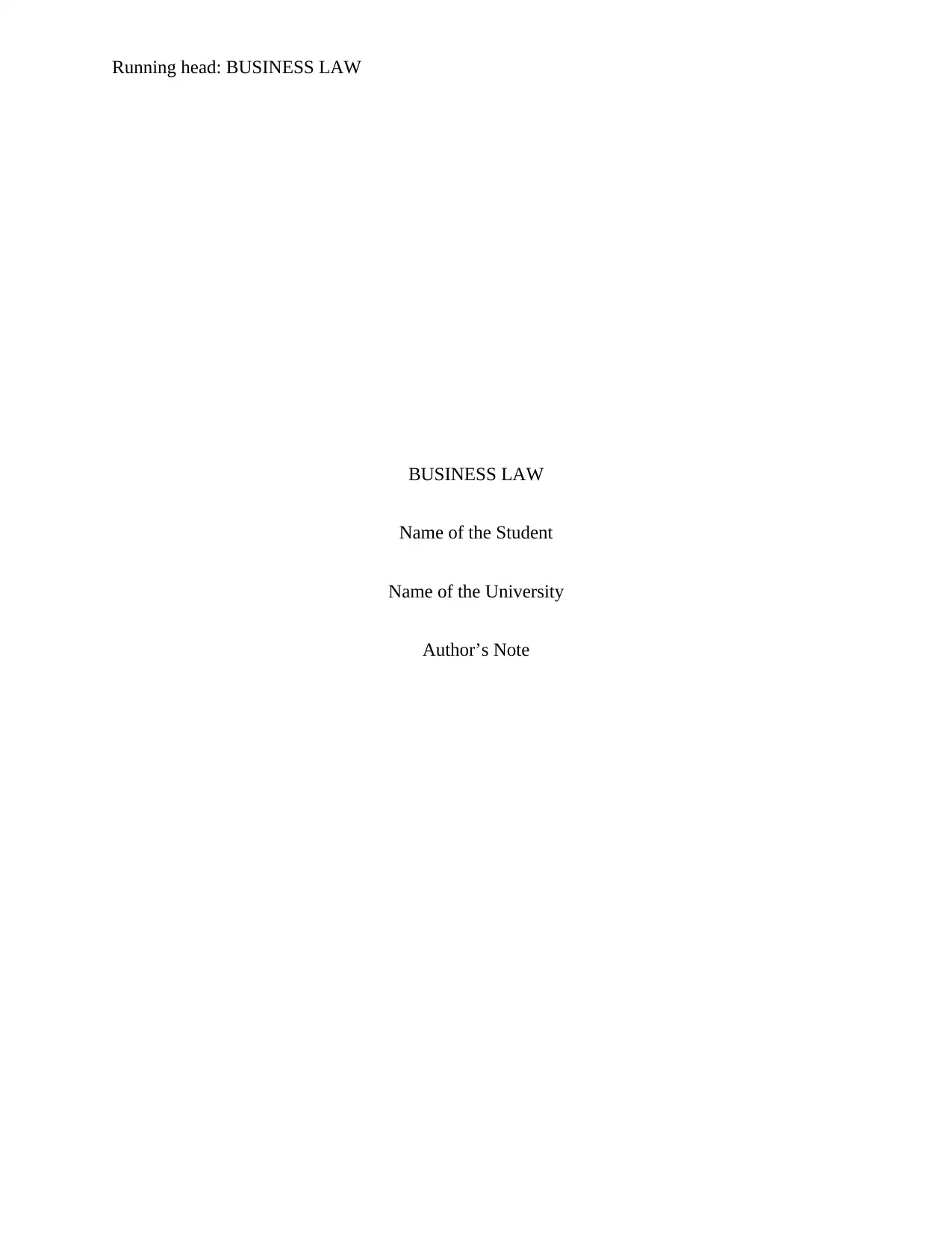
Running head: BUSINESS LAW
BUSINESS LAW
Name of the Student
Name of the University
Author’s Note
BUSINESS LAW
Name of the Student
Name of the University
Author’s Note
Paraphrase This Document
Need a fresh take? Get an instant paraphrase of this document with our AI Paraphraser
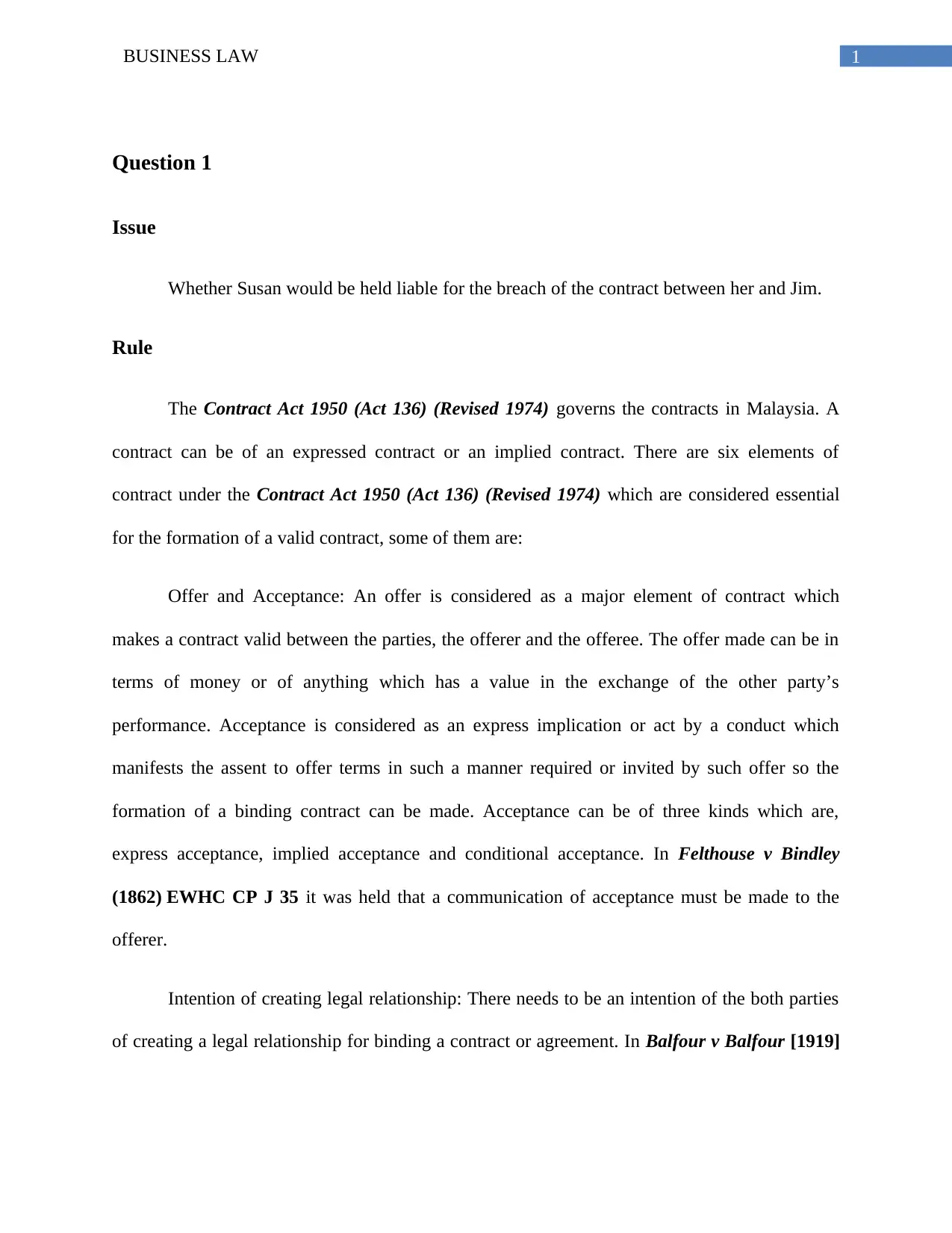
1BUSINESS LAW
Question 1
Issue
Whether Susan would be held liable for the breach of the contract between her and Jim.
Rule
The Contract Act 1950 (Act 136) (Revised 1974) governs the contracts in Malaysia. A
contract can be of an expressed contract or an implied contract. There are six elements of
contract under the Contract Act 1950 (Act 136) (Revised 1974) which are considered essential
for the formation of a valid contract, some of them are:
Offer and Acceptance: An offer is considered as a major element of contract which
makes a contract valid between the parties, the offerer and the offeree. The offer made can be in
terms of money or of anything which has a value in the exchange of the other party’s
performance. Acceptance is considered as an express implication or act by a conduct which
manifests the assent to offer terms in such a manner required or invited by such offer so the
formation of a binding contract can be made. Acceptance can be of three kinds which are,
express acceptance, implied acceptance and conditional acceptance. In Felthouse v Bindley
(1862) EWHC CP J 35 it was held that a communication of acceptance must be made to the
offerer.
Intention of creating legal relationship: There needs to be an intention of the both parties
of creating a legal relationship for binding a contract or agreement. In Balfour v Balfour [1919]
Question 1
Issue
Whether Susan would be held liable for the breach of the contract between her and Jim.
Rule
The Contract Act 1950 (Act 136) (Revised 1974) governs the contracts in Malaysia. A
contract can be of an expressed contract or an implied contract. There are six elements of
contract under the Contract Act 1950 (Act 136) (Revised 1974) which are considered essential
for the formation of a valid contract, some of them are:
Offer and Acceptance: An offer is considered as a major element of contract which
makes a contract valid between the parties, the offerer and the offeree. The offer made can be in
terms of money or of anything which has a value in the exchange of the other party’s
performance. Acceptance is considered as an express implication or act by a conduct which
manifests the assent to offer terms in such a manner required or invited by such offer so the
formation of a binding contract can be made. Acceptance can be of three kinds which are,
express acceptance, implied acceptance and conditional acceptance. In Felthouse v Bindley
(1862) EWHC CP J 35 it was held that a communication of acceptance must be made to the
offerer.
Intention of creating legal relationship: There needs to be an intention of the both parties
of creating a legal relationship for binding a contract or agreement. In Balfour v Balfour [1919]
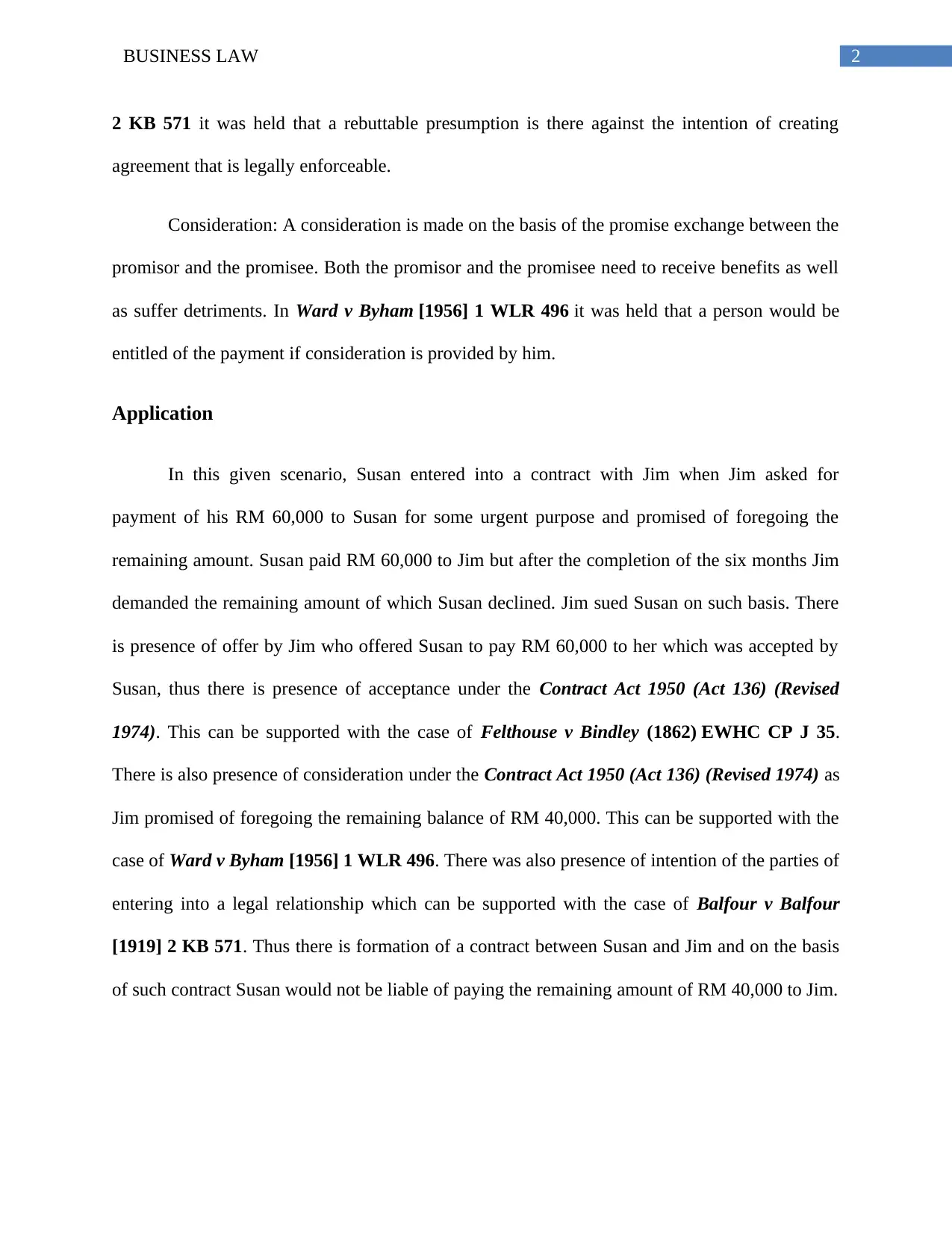
2BUSINESS LAW
2 KB 571 it was held that a rebuttable presumption is there against the intention of creating
agreement that is legally enforceable.
Consideration: A consideration is made on the basis of the promise exchange between the
promisor and the promisee. Both the promisor and the promisee need to receive benefits as well
as suffer detriments. In Ward v Byham [1956] 1 WLR 496 it was held that a person would be
entitled of the payment if consideration is provided by him.
Application
In this given scenario, Susan entered into a contract with Jim when Jim asked for
payment of his RM 60,000 to Susan for some urgent purpose and promised of foregoing the
remaining amount. Susan paid RM 60,000 to Jim but after the completion of the six months Jim
demanded the remaining amount of which Susan declined. Jim sued Susan on such basis. There
is presence of offer by Jim who offered Susan to pay RM 60,000 to her which was accepted by
Susan, thus there is presence of acceptance under the Contract Act 1950 (Act 136) (Revised
1974). This can be supported with the case of Felthouse v Bindley (1862) EWHC CP J 35.
There is also presence of consideration under the Contract Act 1950 (Act 136) (Revised 1974) as
Jim promised of foregoing the remaining balance of RM 40,000. This can be supported with the
case of Ward v Byham [1956] 1 WLR 496. There was also presence of intention of the parties of
entering into a legal relationship which can be supported with the case of Balfour v Balfour
[1919] 2 KB 571. Thus there is formation of a contract between Susan and Jim and on the basis
of such contract Susan would not be liable of paying the remaining amount of RM 40,000 to Jim.
2 KB 571 it was held that a rebuttable presumption is there against the intention of creating
agreement that is legally enforceable.
Consideration: A consideration is made on the basis of the promise exchange between the
promisor and the promisee. Both the promisor and the promisee need to receive benefits as well
as suffer detriments. In Ward v Byham [1956] 1 WLR 496 it was held that a person would be
entitled of the payment if consideration is provided by him.
Application
In this given scenario, Susan entered into a contract with Jim when Jim asked for
payment of his RM 60,000 to Susan for some urgent purpose and promised of foregoing the
remaining amount. Susan paid RM 60,000 to Jim but after the completion of the six months Jim
demanded the remaining amount of which Susan declined. Jim sued Susan on such basis. There
is presence of offer by Jim who offered Susan to pay RM 60,000 to her which was accepted by
Susan, thus there is presence of acceptance under the Contract Act 1950 (Act 136) (Revised
1974). This can be supported with the case of Felthouse v Bindley (1862) EWHC CP J 35.
There is also presence of consideration under the Contract Act 1950 (Act 136) (Revised 1974) as
Jim promised of foregoing the remaining balance of RM 40,000. This can be supported with the
case of Ward v Byham [1956] 1 WLR 496. There was also presence of intention of the parties of
entering into a legal relationship which can be supported with the case of Balfour v Balfour
[1919] 2 KB 571. Thus there is formation of a contract between Susan and Jim and on the basis
of such contract Susan would not be liable of paying the remaining amount of RM 40,000 to Jim.
⊘ This is a preview!⊘
Do you want full access?
Subscribe today to unlock all pages.

Trusted by 1+ million students worldwide
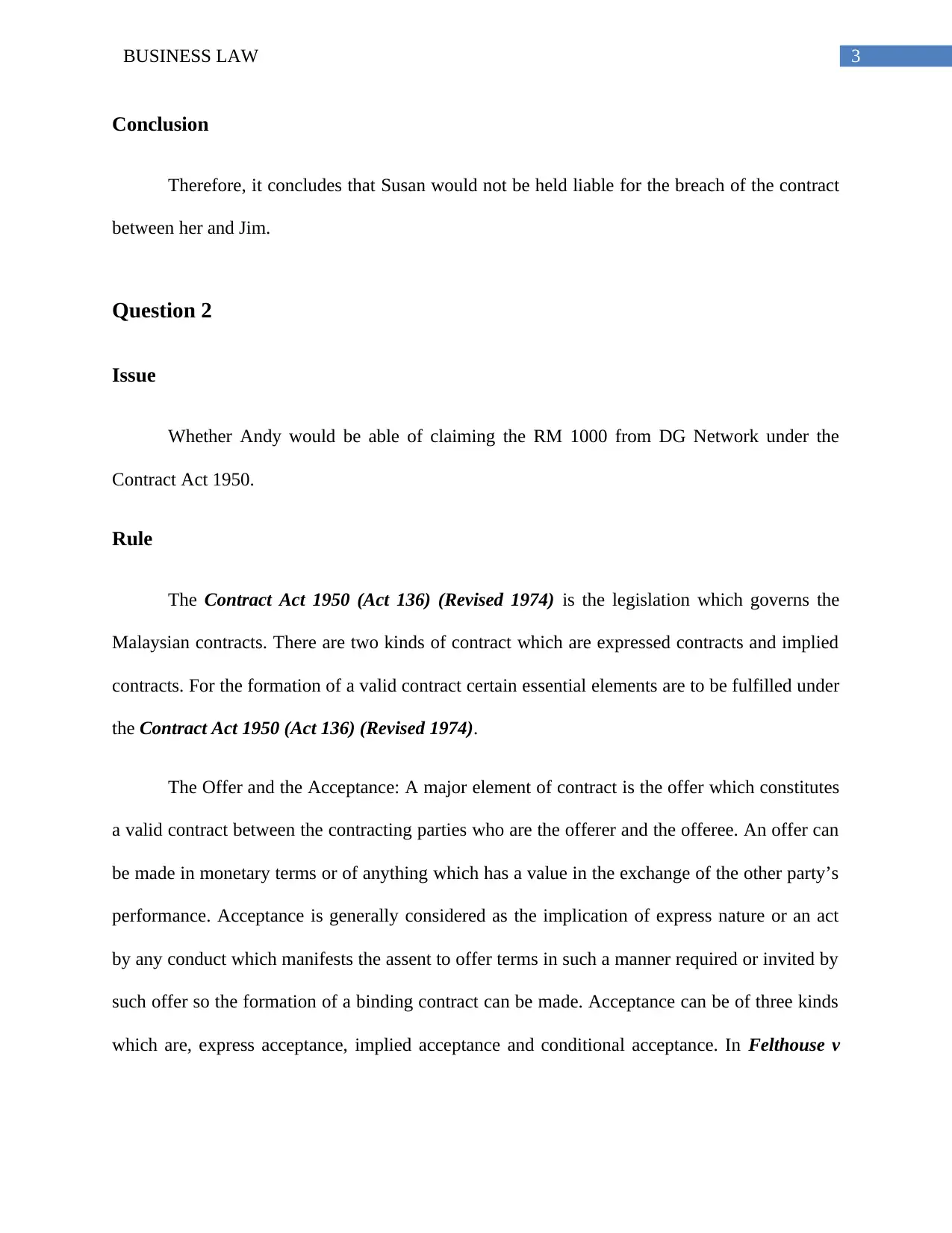
3BUSINESS LAW
Conclusion
Therefore, it concludes that Susan would not be held liable for the breach of the contract
between her and Jim.
Question 2
Issue
Whether Andy would be able of claiming the RM 1000 from DG Network under the
Contract Act 1950.
Rule
The Contract Act 1950 (Act 136) (Revised 1974) is the legislation which governs the
Malaysian contracts. There are two kinds of contract which are expressed contracts and implied
contracts. For the formation of a valid contract certain essential elements are to be fulfilled under
the Contract Act 1950 (Act 136) (Revised 1974).
The Offer and the Acceptance: A major element of contract is the offer which constitutes
a valid contract between the contracting parties who are the offerer and the offeree. An offer can
be made in monetary terms or of anything which has a value in the exchange of the other party’s
performance. Acceptance is generally considered as the implication of express nature or an act
by any conduct which manifests the assent to offer terms in such a manner required or invited by
such offer so the formation of a binding contract can be made. Acceptance can be of three kinds
which are, express acceptance, implied acceptance and conditional acceptance. In Felthouse v
Conclusion
Therefore, it concludes that Susan would not be held liable for the breach of the contract
between her and Jim.
Question 2
Issue
Whether Andy would be able of claiming the RM 1000 from DG Network under the
Contract Act 1950.
Rule
The Contract Act 1950 (Act 136) (Revised 1974) is the legislation which governs the
Malaysian contracts. There are two kinds of contract which are expressed contracts and implied
contracts. For the formation of a valid contract certain essential elements are to be fulfilled under
the Contract Act 1950 (Act 136) (Revised 1974).
The Offer and the Acceptance: A major element of contract is the offer which constitutes
a valid contract between the contracting parties who are the offerer and the offeree. An offer can
be made in monetary terms or of anything which has a value in the exchange of the other party’s
performance. Acceptance is generally considered as the implication of express nature or an act
by any conduct which manifests the assent to offer terms in such a manner required or invited by
such offer so the formation of a binding contract can be made. Acceptance can be of three kinds
which are, express acceptance, implied acceptance and conditional acceptance. In Felthouse v
Paraphrase This Document
Need a fresh take? Get an instant paraphrase of this document with our AI Paraphraser
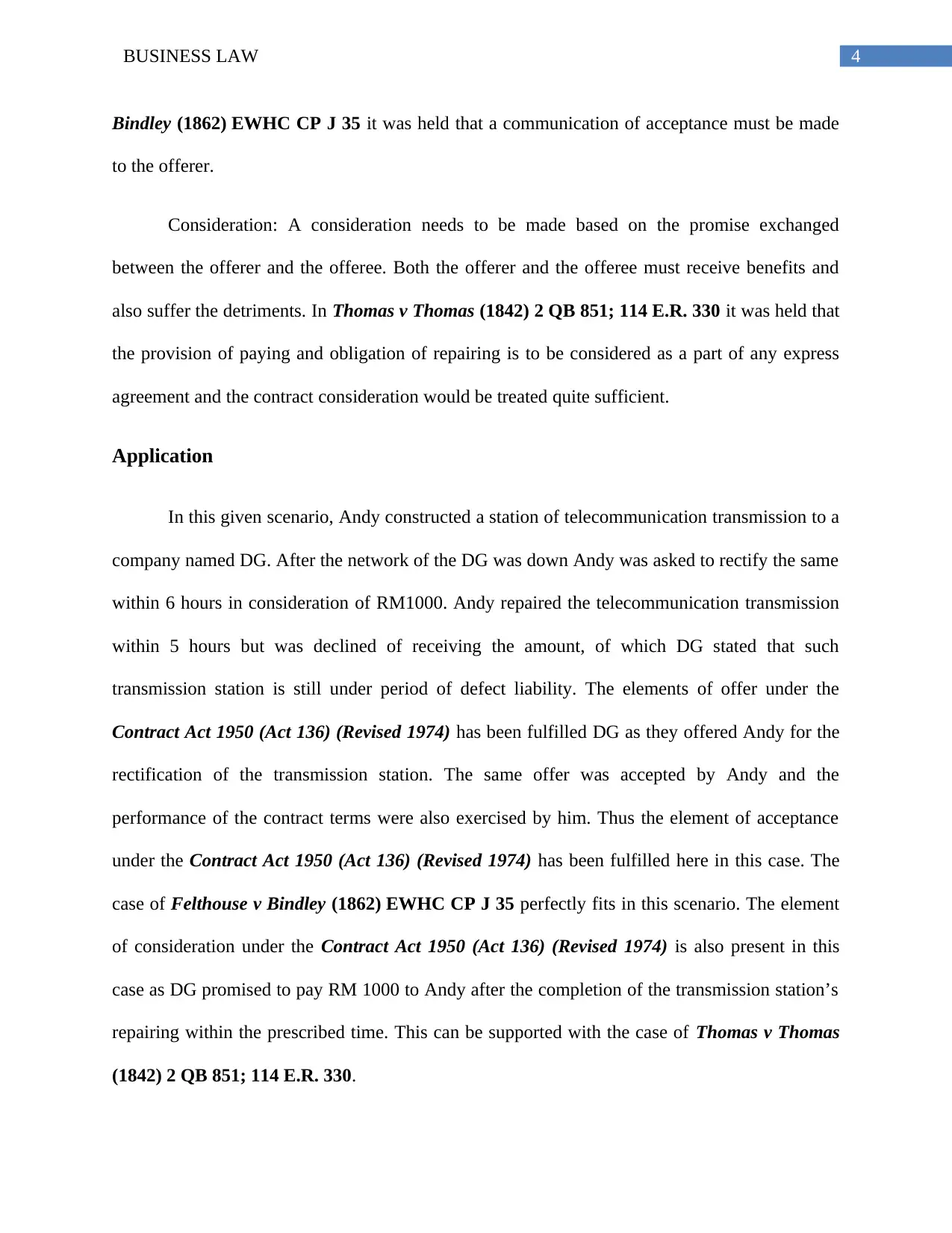
4BUSINESS LAW
Bindley (1862) EWHC CP J 35 it was held that a communication of acceptance must be made
to the offerer.
Consideration: A consideration needs to be made based on the promise exchanged
between the offerer and the offeree. Both the offerer and the offeree must receive benefits and
also suffer the detriments. In Thomas v Thomas (1842) 2 QB 851; 114 E.R. 330 it was held that
the provision of paying and obligation of repairing is to be considered as a part of any express
agreement and the contract consideration would be treated quite sufficient.
Application
In this given scenario, Andy constructed a station of telecommunication transmission to a
company named DG. After the network of the DG was down Andy was asked to rectify the same
within 6 hours in consideration of RM1000. Andy repaired the telecommunication transmission
within 5 hours but was declined of receiving the amount, of which DG stated that such
transmission station is still under period of defect liability. The elements of offer under the
Contract Act 1950 (Act 136) (Revised 1974) has been fulfilled DG as they offered Andy for the
rectification of the transmission station. The same offer was accepted by Andy and the
performance of the contract terms were also exercised by him. Thus the element of acceptance
under the Contract Act 1950 (Act 136) (Revised 1974) has been fulfilled here in this case. The
case of Felthouse v Bindley (1862) EWHC CP J 35 perfectly fits in this scenario. The element
of consideration under the Contract Act 1950 (Act 136) (Revised 1974) is also present in this
case as DG promised to pay RM 1000 to Andy after the completion of the transmission station’s
repairing within the prescribed time. This can be supported with the case of Thomas v Thomas
(1842) 2 QB 851; 114 E.R. 330.
Bindley (1862) EWHC CP J 35 it was held that a communication of acceptance must be made
to the offerer.
Consideration: A consideration needs to be made based on the promise exchanged
between the offerer and the offeree. Both the offerer and the offeree must receive benefits and
also suffer the detriments. In Thomas v Thomas (1842) 2 QB 851; 114 E.R. 330 it was held that
the provision of paying and obligation of repairing is to be considered as a part of any express
agreement and the contract consideration would be treated quite sufficient.
Application
In this given scenario, Andy constructed a station of telecommunication transmission to a
company named DG. After the network of the DG was down Andy was asked to rectify the same
within 6 hours in consideration of RM1000. Andy repaired the telecommunication transmission
within 5 hours but was declined of receiving the amount, of which DG stated that such
transmission station is still under period of defect liability. The elements of offer under the
Contract Act 1950 (Act 136) (Revised 1974) has been fulfilled DG as they offered Andy for the
rectification of the transmission station. The same offer was accepted by Andy and the
performance of the contract terms were also exercised by him. Thus the element of acceptance
under the Contract Act 1950 (Act 136) (Revised 1974) has been fulfilled here in this case. The
case of Felthouse v Bindley (1862) EWHC CP J 35 perfectly fits in this scenario. The element
of consideration under the Contract Act 1950 (Act 136) (Revised 1974) is also present in this
case as DG promised to pay RM 1000 to Andy after the completion of the transmission station’s
repairing within the prescribed time. This can be supported with the case of Thomas v Thomas
(1842) 2 QB 851; 114 E.R. 330.
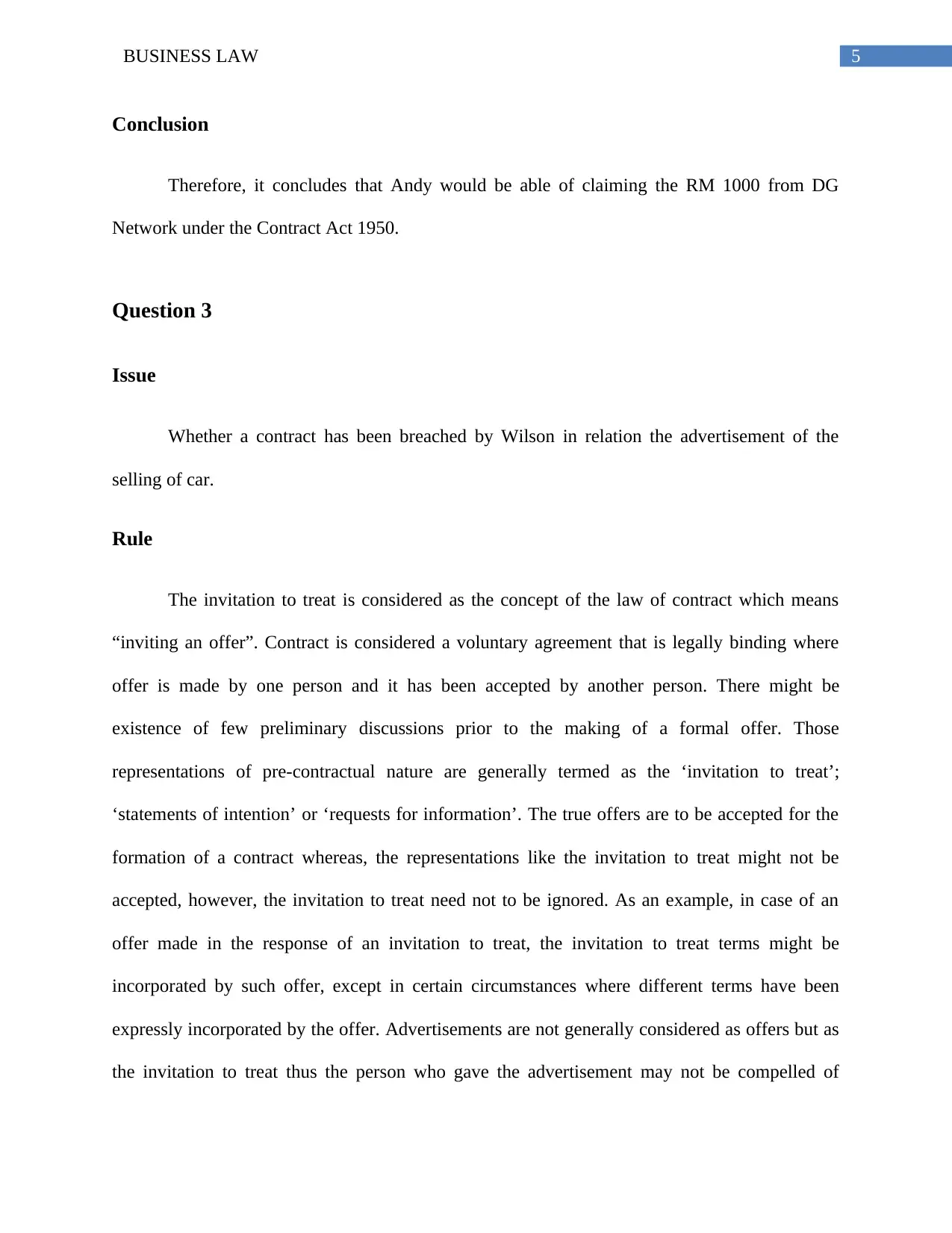
5BUSINESS LAW
Conclusion
Therefore, it concludes that Andy would be able of claiming the RM 1000 from DG
Network under the Contract Act 1950.
Question 3
Issue
Whether a contract has been breached by Wilson in relation the advertisement of the
selling of car.
Rule
The invitation to treat is considered as the concept of the law of contract which means
“inviting an offer”. Contract is considered a voluntary agreement that is legally binding where
offer is made by one person and it has been accepted by another person. There might be
existence of few preliminary discussions prior to the making of a formal offer. Those
representations of pre-contractual nature are generally termed as the ‘invitation to treat’;
‘statements of intention’ or ‘requests for information’. The true offers are to be accepted for the
formation of a contract whereas, the representations like the invitation to treat might not be
accepted, however, the invitation to treat need not to be ignored. As an example, in case of an
offer made in the response of an invitation to treat, the invitation to treat terms might be
incorporated by such offer, except in certain circumstances where different terms have been
expressly incorporated by the offer. Advertisements are not generally considered as offers but as
the invitation to treat thus the person who gave the advertisement may not be compelled of
Conclusion
Therefore, it concludes that Andy would be able of claiming the RM 1000 from DG
Network under the Contract Act 1950.
Question 3
Issue
Whether a contract has been breached by Wilson in relation the advertisement of the
selling of car.
Rule
The invitation to treat is considered as the concept of the law of contract which means
“inviting an offer”. Contract is considered a voluntary agreement that is legally binding where
offer is made by one person and it has been accepted by another person. There might be
existence of few preliminary discussions prior to the making of a formal offer. Those
representations of pre-contractual nature are generally termed as the ‘invitation to treat’;
‘statements of intention’ or ‘requests for information’. The true offers are to be accepted for the
formation of a contract whereas, the representations like the invitation to treat might not be
accepted, however, the invitation to treat need not to be ignored. As an example, in case of an
offer made in the response of an invitation to treat, the invitation to treat terms might be
incorporated by such offer, except in certain circumstances where different terms have been
expressly incorporated by the offer. Advertisements are not generally considered as offers but as
the invitation to treat thus the person who gave the advertisement may not be compelled of
⊘ This is a preview!⊘
Do you want full access?
Subscribe today to unlock all pages.

Trusted by 1+ million students worldwide
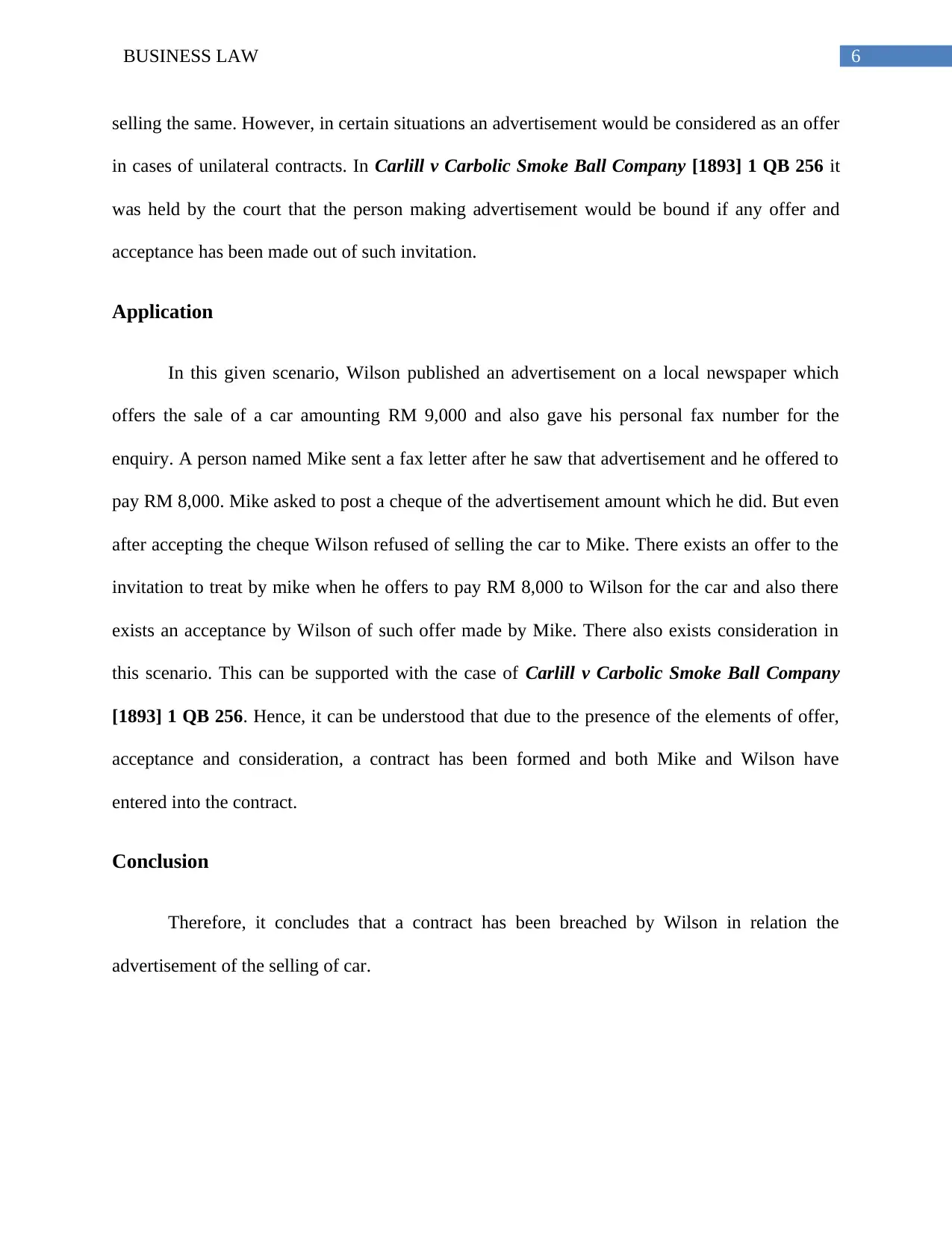
6BUSINESS LAW
selling the same. However, in certain situations an advertisement would be considered as an offer
in cases of unilateral contracts. In Carlill v Carbolic Smoke Ball Company [1893] 1 QB 256 it
was held by the court that the person making advertisement would be bound if any offer and
acceptance has been made out of such invitation.
Application
In this given scenario, Wilson published an advertisement on a local newspaper which
offers the sale of a car amounting RM 9,000 and also gave his personal fax number for the
enquiry. A person named Mike sent a fax letter after he saw that advertisement and he offered to
pay RM 8,000. Mike asked to post a cheque of the advertisement amount which he did. But even
after accepting the cheque Wilson refused of selling the car to Mike. There exists an offer to the
invitation to treat by mike when he offers to pay RM 8,000 to Wilson for the car and also there
exists an acceptance by Wilson of such offer made by Mike. There also exists consideration in
this scenario. This can be supported with the case of Carlill v Carbolic Smoke Ball Company
[1893] 1 QB 256. Hence, it can be understood that due to the presence of the elements of offer,
acceptance and consideration, a contract has been formed and both Mike and Wilson have
entered into the contract.
Conclusion
Therefore, it concludes that a contract has been breached by Wilson in relation the
advertisement of the selling of car.
selling the same. However, in certain situations an advertisement would be considered as an offer
in cases of unilateral contracts. In Carlill v Carbolic Smoke Ball Company [1893] 1 QB 256 it
was held by the court that the person making advertisement would be bound if any offer and
acceptance has been made out of such invitation.
Application
In this given scenario, Wilson published an advertisement on a local newspaper which
offers the sale of a car amounting RM 9,000 and also gave his personal fax number for the
enquiry. A person named Mike sent a fax letter after he saw that advertisement and he offered to
pay RM 8,000. Mike asked to post a cheque of the advertisement amount which he did. But even
after accepting the cheque Wilson refused of selling the car to Mike. There exists an offer to the
invitation to treat by mike when he offers to pay RM 8,000 to Wilson for the car and also there
exists an acceptance by Wilson of such offer made by Mike. There also exists consideration in
this scenario. This can be supported with the case of Carlill v Carbolic Smoke Ball Company
[1893] 1 QB 256. Hence, it can be understood that due to the presence of the elements of offer,
acceptance and consideration, a contract has been formed and both Mike and Wilson have
entered into the contract.
Conclusion
Therefore, it concludes that a contract has been breached by Wilson in relation the
advertisement of the selling of car.
Paraphrase This Document
Need a fresh take? Get an instant paraphrase of this document with our AI Paraphraser
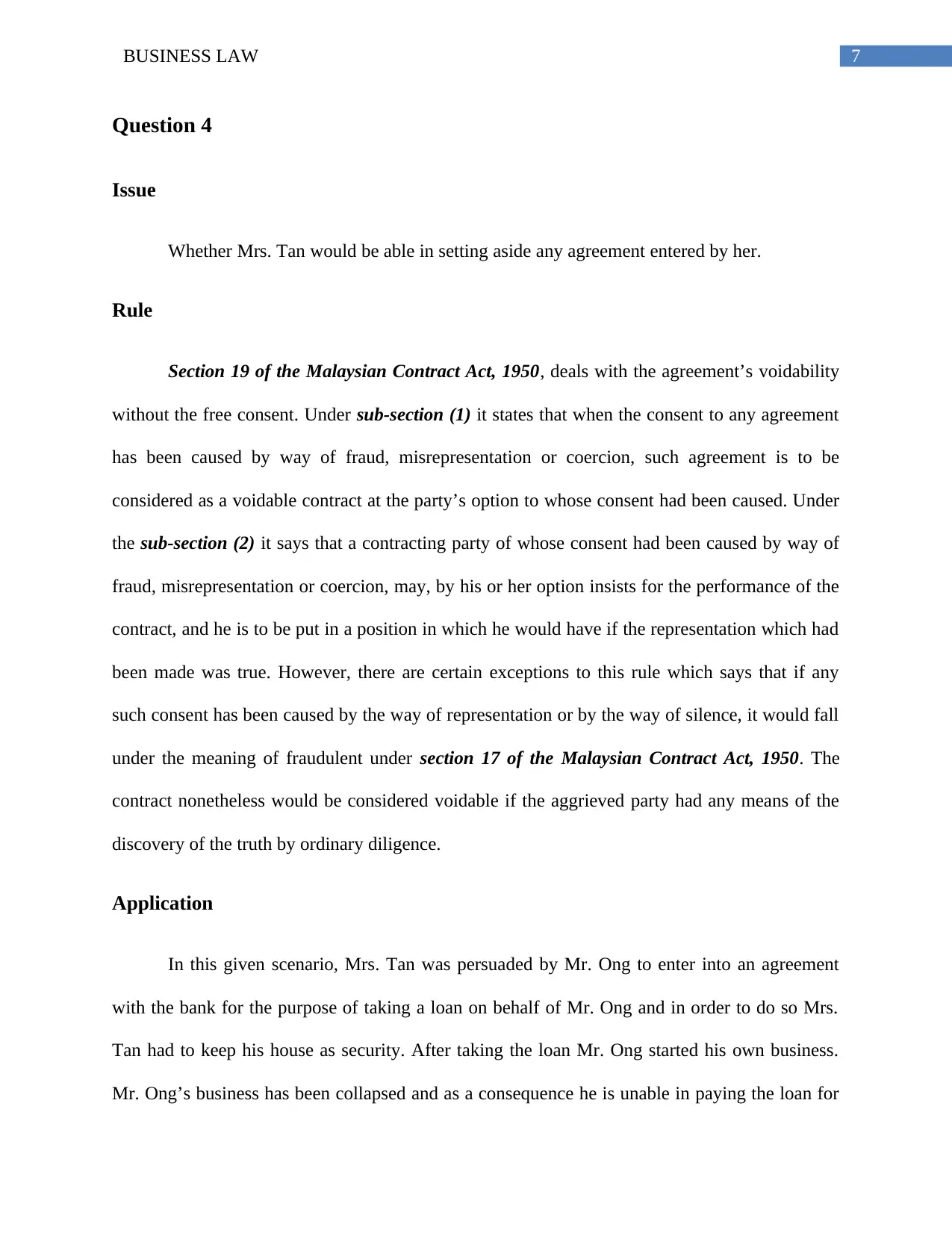
7BUSINESS LAW
Question 4
Issue
Whether Mrs. Tan would be able in setting aside any agreement entered by her.
Rule
Section 19 of the Malaysian Contract Act, 1950, deals with the agreement’s voidability
without the free consent. Under sub-section (1) it states that when the consent to any agreement
has been caused by way of fraud, misrepresentation or coercion, such agreement is to be
considered as a voidable contract at the party’s option to whose consent had been caused. Under
the sub-section (2) it says that a contracting party of whose consent had been caused by way of
fraud, misrepresentation or coercion, may, by his or her option insists for the performance of the
contract, and he is to be put in a position in which he would have if the representation which had
been made was true. However, there are certain exceptions to this rule which says that if any
such consent has been caused by the way of representation or by the way of silence, it would fall
under the meaning of fraudulent under section 17 of the Malaysian Contract Act, 1950. The
contract nonetheless would be considered voidable if the aggrieved party had any means of the
discovery of the truth by ordinary diligence.
Application
In this given scenario, Mrs. Tan was persuaded by Mr. Ong to enter into an agreement
with the bank for the purpose of taking a loan on behalf of Mr. Ong and in order to do so Mrs.
Tan had to keep his house as security. After taking the loan Mr. Ong started his own business.
Mr. Ong’s business has been collapsed and as a consequence he is unable in paying the loan for
Question 4
Issue
Whether Mrs. Tan would be able in setting aside any agreement entered by her.
Rule
Section 19 of the Malaysian Contract Act, 1950, deals with the agreement’s voidability
without the free consent. Under sub-section (1) it states that when the consent to any agreement
has been caused by way of fraud, misrepresentation or coercion, such agreement is to be
considered as a voidable contract at the party’s option to whose consent had been caused. Under
the sub-section (2) it says that a contracting party of whose consent had been caused by way of
fraud, misrepresentation or coercion, may, by his or her option insists for the performance of the
contract, and he is to be put in a position in which he would have if the representation which had
been made was true. However, there are certain exceptions to this rule which says that if any
such consent has been caused by the way of representation or by the way of silence, it would fall
under the meaning of fraudulent under section 17 of the Malaysian Contract Act, 1950. The
contract nonetheless would be considered voidable if the aggrieved party had any means of the
discovery of the truth by ordinary diligence.
Application
In this given scenario, Mrs. Tan was persuaded by Mr. Ong to enter into an agreement
with the bank for the purpose of taking a loan on behalf of Mr. Ong and in order to do so Mrs.
Tan had to keep his house as security. After taking the loan Mr. Ong started his own business.
Mr. Ong’s business has been collapsed and as a consequence he is unable in paying the loan for
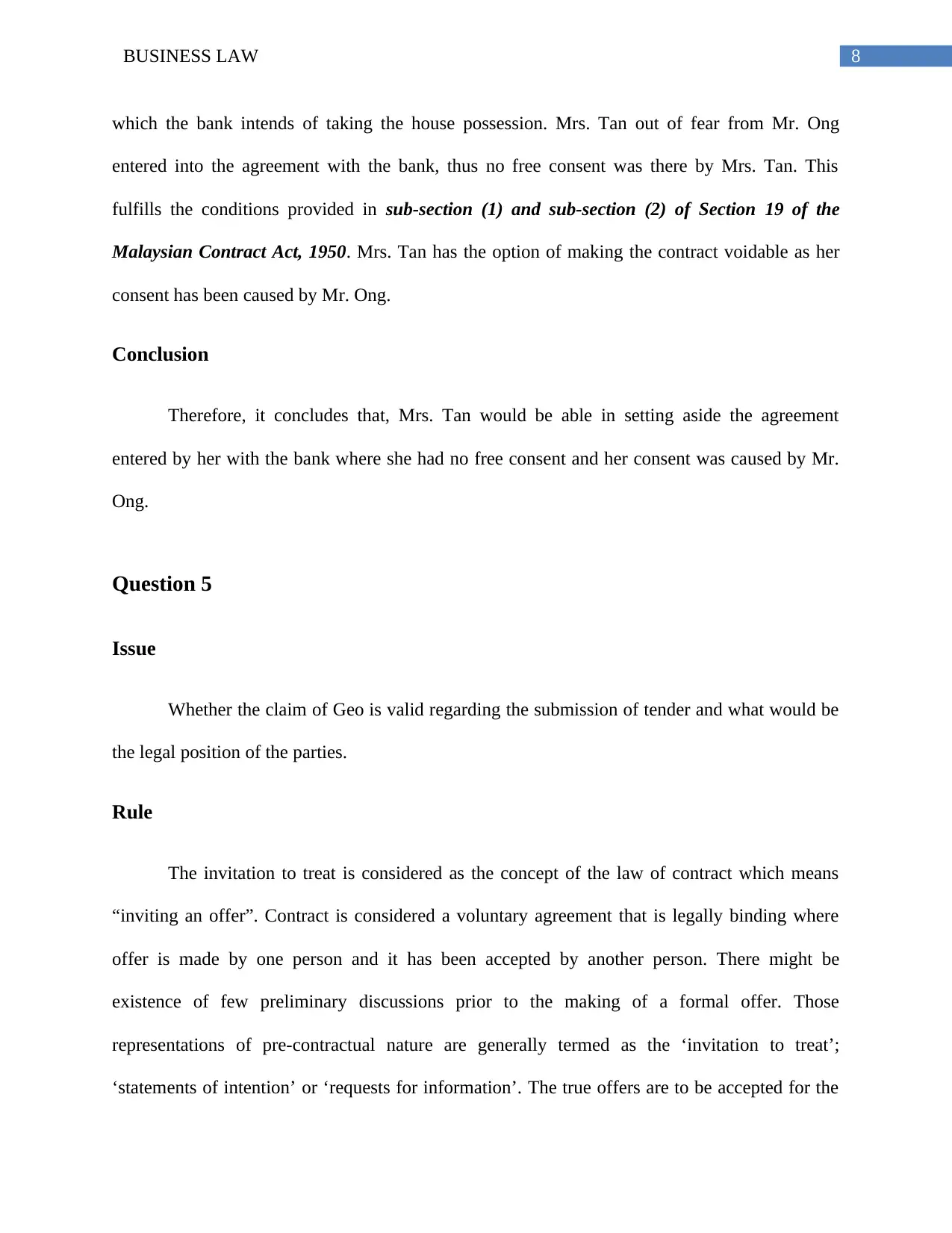
8BUSINESS LAW
which the bank intends of taking the house possession. Mrs. Tan out of fear from Mr. Ong
entered into the agreement with the bank, thus no free consent was there by Mrs. Tan. This
fulfills the conditions provided in sub-section (1) and sub-section (2) of Section 19 of the
Malaysian Contract Act, 1950. Mrs. Tan has the option of making the contract voidable as her
consent has been caused by Mr. Ong.
Conclusion
Therefore, it concludes that, Mrs. Tan would be able in setting aside the agreement
entered by her with the bank where she had no free consent and her consent was caused by Mr.
Ong.
Question 5
Issue
Whether the claim of Geo is valid regarding the submission of tender and what would be
the legal position of the parties.
Rule
The invitation to treat is considered as the concept of the law of contract which means
“inviting an offer”. Contract is considered a voluntary agreement that is legally binding where
offer is made by one person and it has been accepted by another person. There might be
existence of few preliminary discussions prior to the making of a formal offer. Those
representations of pre-contractual nature are generally termed as the ‘invitation to treat’;
‘statements of intention’ or ‘requests for information’. The true offers are to be accepted for the
which the bank intends of taking the house possession. Mrs. Tan out of fear from Mr. Ong
entered into the agreement with the bank, thus no free consent was there by Mrs. Tan. This
fulfills the conditions provided in sub-section (1) and sub-section (2) of Section 19 of the
Malaysian Contract Act, 1950. Mrs. Tan has the option of making the contract voidable as her
consent has been caused by Mr. Ong.
Conclusion
Therefore, it concludes that, Mrs. Tan would be able in setting aside the agreement
entered by her with the bank where she had no free consent and her consent was caused by Mr.
Ong.
Question 5
Issue
Whether the claim of Geo is valid regarding the submission of tender and what would be
the legal position of the parties.
Rule
The invitation to treat is considered as the concept of the law of contract which means
“inviting an offer”. Contract is considered a voluntary agreement that is legally binding where
offer is made by one person and it has been accepted by another person. There might be
existence of few preliminary discussions prior to the making of a formal offer. Those
representations of pre-contractual nature are generally termed as the ‘invitation to treat’;
‘statements of intention’ or ‘requests for information’. The true offers are to be accepted for the
⊘ This is a preview!⊘
Do you want full access?
Subscribe today to unlock all pages.

Trusted by 1+ million students worldwide
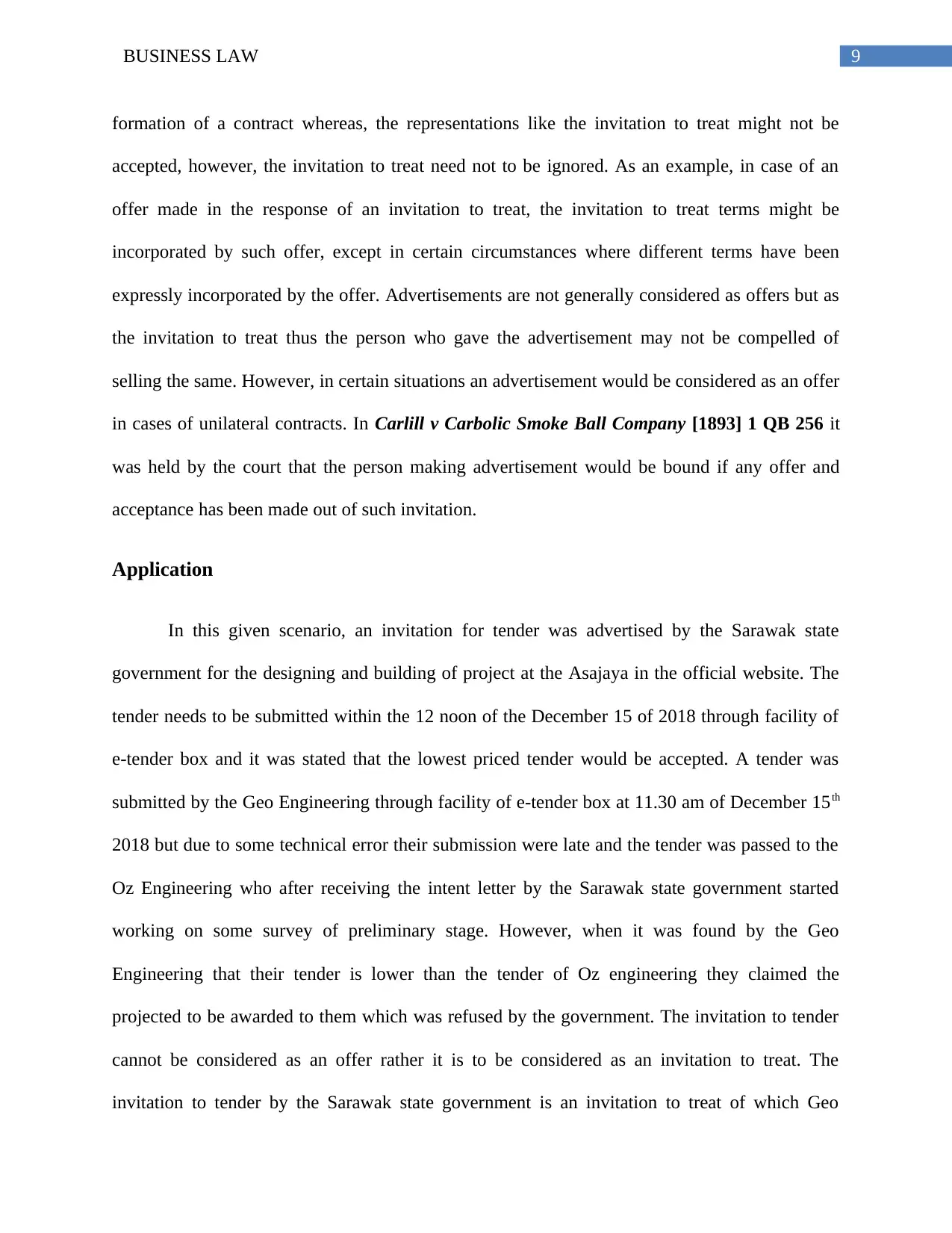
9BUSINESS LAW
formation of a contract whereas, the representations like the invitation to treat might not be
accepted, however, the invitation to treat need not to be ignored. As an example, in case of an
offer made in the response of an invitation to treat, the invitation to treat terms might be
incorporated by such offer, except in certain circumstances where different terms have been
expressly incorporated by the offer. Advertisements are not generally considered as offers but as
the invitation to treat thus the person who gave the advertisement may not be compelled of
selling the same. However, in certain situations an advertisement would be considered as an offer
in cases of unilateral contracts. In Carlill v Carbolic Smoke Ball Company [1893] 1 QB 256 it
was held by the court that the person making advertisement would be bound if any offer and
acceptance has been made out of such invitation.
Application
In this given scenario, an invitation for tender was advertised by the Sarawak state
government for the designing and building of project at the Asajaya in the official website. The
tender needs to be submitted within the 12 noon of the December 15 of 2018 through facility of
e-tender box and it was stated that the lowest priced tender would be accepted. A tender was
submitted by the Geo Engineering through facility of e-tender box at 11.30 am of December 15th
2018 but due to some technical error their submission were late and the tender was passed to the
Oz Engineering who after receiving the intent letter by the Sarawak state government started
working on some survey of preliminary stage. However, when it was found by the Geo
Engineering that their tender is lower than the tender of Oz engineering they claimed the
projected to be awarded to them which was refused by the government. The invitation to tender
cannot be considered as an offer rather it is to be considered as an invitation to treat. The
invitation to tender by the Sarawak state government is an invitation to treat of which Geo
formation of a contract whereas, the representations like the invitation to treat might not be
accepted, however, the invitation to treat need not to be ignored. As an example, in case of an
offer made in the response of an invitation to treat, the invitation to treat terms might be
incorporated by such offer, except in certain circumstances where different terms have been
expressly incorporated by the offer. Advertisements are not generally considered as offers but as
the invitation to treat thus the person who gave the advertisement may not be compelled of
selling the same. However, in certain situations an advertisement would be considered as an offer
in cases of unilateral contracts. In Carlill v Carbolic Smoke Ball Company [1893] 1 QB 256 it
was held by the court that the person making advertisement would be bound if any offer and
acceptance has been made out of such invitation.
Application
In this given scenario, an invitation for tender was advertised by the Sarawak state
government for the designing and building of project at the Asajaya in the official website. The
tender needs to be submitted within the 12 noon of the December 15 of 2018 through facility of
e-tender box and it was stated that the lowest priced tender would be accepted. A tender was
submitted by the Geo Engineering through facility of e-tender box at 11.30 am of December 15th
2018 but due to some technical error their submission were late and the tender was passed to the
Oz Engineering who after receiving the intent letter by the Sarawak state government started
working on some survey of preliminary stage. However, when it was found by the Geo
Engineering that their tender is lower than the tender of Oz engineering they claimed the
projected to be awarded to them which was refused by the government. The invitation to tender
cannot be considered as an offer rather it is to be considered as an invitation to treat. The
invitation to tender by the Sarawak state government is an invitation to treat of which Geo
Paraphrase This Document
Need a fresh take? Get an instant paraphrase of this document with our AI Paraphraser
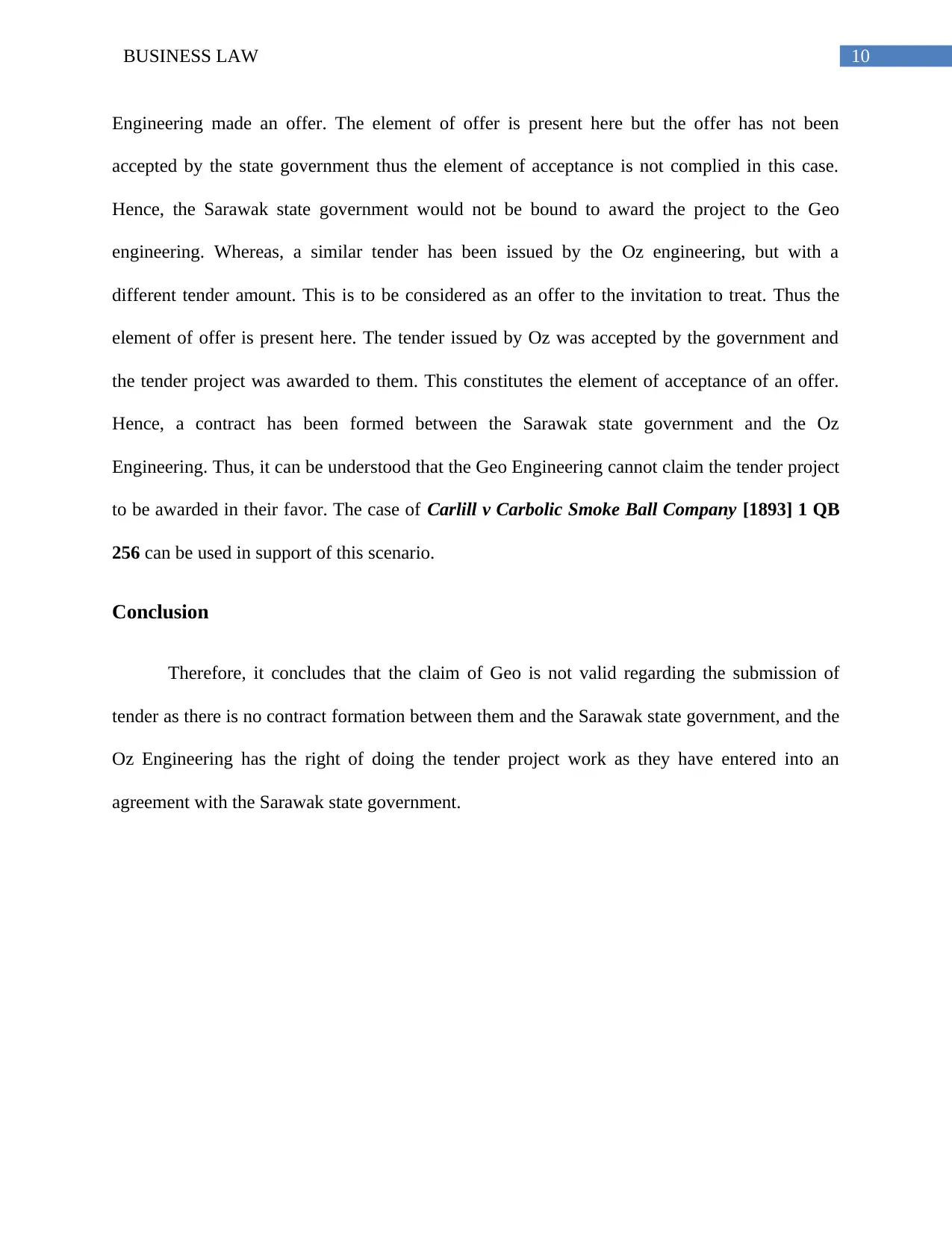
10BUSINESS LAW
Engineering made an offer. The element of offer is present here but the offer has not been
accepted by the state government thus the element of acceptance is not complied in this case.
Hence, the Sarawak state government would not be bound to award the project to the Geo
engineering. Whereas, a similar tender has been issued by the Oz engineering, but with a
different tender amount. This is to be considered as an offer to the invitation to treat. Thus the
element of offer is present here. The tender issued by Oz was accepted by the government and
the tender project was awarded to them. This constitutes the element of acceptance of an offer.
Hence, a contract has been formed between the Sarawak state government and the Oz
Engineering. Thus, it can be understood that the Geo Engineering cannot claim the tender project
to be awarded in their favor. The case of Carlill v Carbolic Smoke Ball Company [1893] 1 QB
256 can be used in support of this scenario.
Conclusion
Therefore, it concludes that the claim of Geo is not valid regarding the submission of
tender as there is no contract formation between them and the Sarawak state government, and the
Oz Engineering has the right of doing the tender project work as they have entered into an
agreement with the Sarawak state government.
Engineering made an offer. The element of offer is present here but the offer has not been
accepted by the state government thus the element of acceptance is not complied in this case.
Hence, the Sarawak state government would not be bound to award the project to the Geo
engineering. Whereas, a similar tender has been issued by the Oz engineering, but with a
different tender amount. This is to be considered as an offer to the invitation to treat. Thus the
element of offer is present here. The tender issued by Oz was accepted by the government and
the tender project was awarded to them. This constitutes the element of acceptance of an offer.
Hence, a contract has been formed between the Sarawak state government and the Oz
Engineering. Thus, it can be understood that the Geo Engineering cannot claim the tender project
to be awarded in their favor. The case of Carlill v Carbolic Smoke Ball Company [1893] 1 QB
256 can be used in support of this scenario.
Conclusion
Therefore, it concludes that the claim of Geo is not valid regarding the submission of
tender as there is no contract formation between them and the Sarawak state government, and the
Oz Engineering has the right of doing the tender project work as they have entered into an
agreement with the Sarawak state government.
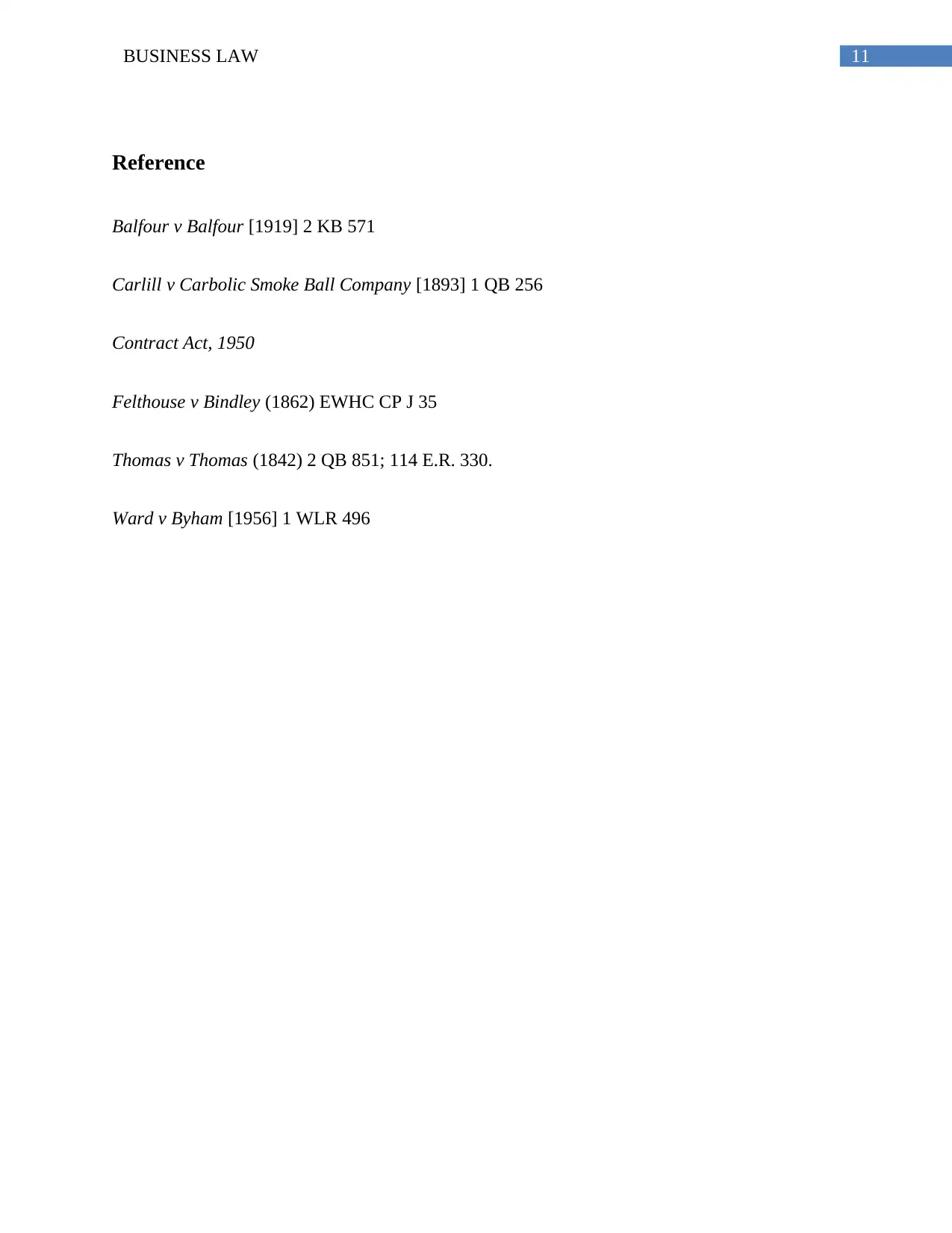
11BUSINESS LAW
Reference
Balfour v Balfour [1919] 2 KB 571
Carlill v Carbolic Smoke Ball Company [1893] 1 QB 256
Contract Act, 1950
Felthouse v Bindley (1862) EWHC CP J 35
Thomas v Thomas (1842) 2 QB 851; 114 E.R. 330.
Ward v Byham [1956] 1 WLR 496
Reference
Balfour v Balfour [1919] 2 KB 571
Carlill v Carbolic Smoke Ball Company [1893] 1 QB 256
Contract Act, 1950
Felthouse v Bindley (1862) EWHC CP J 35
Thomas v Thomas (1842) 2 QB 851; 114 E.R. 330.
Ward v Byham [1956] 1 WLR 496
⊘ This is a preview!⊘
Do you want full access?
Subscribe today to unlock all pages.

Trusted by 1+ million students worldwide
1 out of 12
Your All-in-One AI-Powered Toolkit for Academic Success.
+13062052269
info@desklib.com
Available 24*7 on WhatsApp / Email
![[object Object]](/_next/static/media/star-bottom.7253800d.svg)
Unlock your academic potential
Copyright © 2020–2026 A2Z Services. All Rights Reserved. Developed and managed by ZUCOL.


